Solar eclipse of December 14, 2020
| Solar eclipse of December 14, 2020 | |
|---|---|
UTC) | |
| Greatest eclipse | 16:14:39 |
| References | |
| Saros | 142 (23 of 72) |
| Catalog # (SE5000) | 9554 |
A total
Visibility
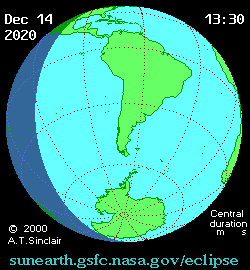
Chile
Totality made landfall in
Argentina
Totality was visible across the Northern
Scientific observations
The ionospheric effects of the eclipse were expected to be monitored as part of the December 2020 Eclipse Festival of Frequency Measurement, a citizen science experiment organized through the Amateur Radio Science Citizen Investigation (HamSCI).[7] Also, a prediction was made for a group of ionospheric stations in South America, using a numerical model (SUPIM-INPE), of the ionospheric response to this event.[8]
Gallery
-
Partial fromRengo, Chile, 15:07 UTC
-
Partial fromSantiago de Chile, 16:02 UTC
-
Partial fromPuerto Varas, Chile, 16:09 UTC
-
Totality from Ministro Ramos Mexía, Argentina, 16:14 UTC
-
Partial from Manuel B. Gonnet, Argentina, 16:32 UTC
-
Partial fromGuarulhos, Brazil, 17:01 UTC
-
Partial from Taubaté, Brazil, 17:13 UTC
-
Totality from Valcheta, Argentina
Related eclipses
This eclipse took place one
Eclipses of 2020
- A penumbral lunar eclipse on January 10.
- A penumbral lunar eclipse on June 5.
- An annular solar eclipse on June 21.
- A penumbral lunar eclipse on July 5.
- A penumbral lunar eclipse on November 30.
- A total solar eclipse on December 14.
Tzolkinex
- Preceded: Solar eclipse of November 3, 2013
- Followed: Solar eclipse of January 26, 2028
Half-Saros cycle
- Preceded: Lunar eclipse of December 10, 2011
- Followed: Lunar eclipse of December 20, 2029
Tritos
- Preceded: Solar eclipse of January 15, 2010
- Followed: Solar eclipse of November 14, 2031
Solar Saros 142
- Preceded: Solar eclipse of December 4, 2002
- Followed: Solar eclipse of December 26, 2038
Inex
- Preceded: Solar eclipse of January 4, 1992
- Followed: Solar eclipse of November 25, 2049
Triad
- Preceded: Solar eclipse of February 14, 1934
- Followed: Solar eclipse of October 16, 2107
Solar eclipses of 2018–2021
This eclipse is a member of a semester series. An eclipse in a semester series of solar eclipses repeats approximately every 177 days and 4 hours (a semester) at alternating nodes of the Moon's orbit.[9]
Note: Partial solar eclipses on February 15, 2018, and August 11, 2018, occurred during the previous semester series.
| Ascending node | Descending node | |||||
|---|---|---|---|---|---|---|
| Saros | Map | Gamma | Saros | Map | Gamma | |
117 Partial from Melbourne, Australia |
2018 July 13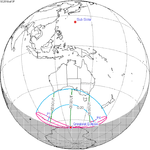 Partial |
−1.35423 | 122 Partial from Nakhodka, Russia |
2019 January 6 Partial |
1.14174 | |
127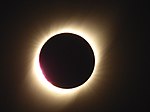 La Serena, Chile |
2019 July 2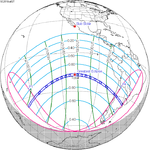 Total |
−0.64656 | 132 Jaffna, Sri Lanka
|
2019 December 26 Annular |
0.41351 | |
137 Beigang, Yunlin, Taiwan |
2020 June 21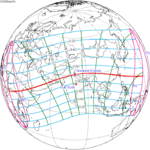 Annular |
0.12090 | 142 Gorbea, Chile |
2020 December 14 Total |
−0.29394 | |
| 147 Halifax, Canada
|
2021 June 10 Annular |
0.91516 | 152 From HMS Protector off South Georgia |
2021 December 4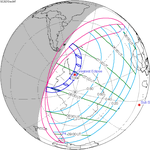 Total |
−0.95261 | |
Saros 142
It is a part of Saros cycle 142, repeating every 18 years, 11 days, containing 72 events. The series started with partial solar eclipse on April 17, 1624. It contains one hybrid eclipse on July 14, 1768, and total eclipses from July 25, 1786 through October 29, 2543. The series ends at member 72 as a partial eclipse on June 5, 2904. The longest duration of totality will be 6 minutes, 34 seconds on May 28, 2291. All eclipses in this series occurs at the Moon’s descending node.[10]
| Series members 17–41 occur between 1901 and 2359 | ||
|---|---|---|
| 17 | 18 | 19 |
 October 10, 1912 |
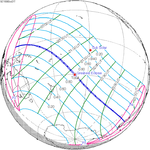 October 21, 1930 |
 November 1, 1948 |
| 20 | 21 | 22 |
 November 12, 1966 |
 November 22, 1984 |
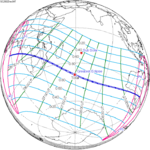 December 4, 2002 |
| 23 | 24 | 25 |
 December 14, 2020 |
 December 26, 2038 |
 January 5, 2057 |
| 26 | 27 | 28 |
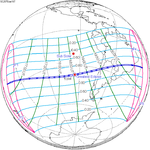 January 16, 2075 |
 January 27, 2093 |
 February 8, 2111 |
| 29 | 30 | 31 |
 February 18, 2129 |
 March 2, 2147 |
 March 12, 2165 |
| 32 | 33 | 34 |
 March 23, 2183 |
 April 4, 2201 |
 April 15, 2219 |
| 35 | 36 | 37 |
 April 25, 2237 |
 May 7, 2255 |
 May 17, 2273 |
| 38 | 39 | 40 |
 May 28, 2291 |
 June 9, 2309 |
 June 20, 2327 |
| 41 | ||
 June 30, 2345 | ||
Metonic cycle
The metonic series repeats eclipses every 19 years (6939.69 days), lasting about 5 cycles. Eclipses occur in nearly the same calendar date. In addition, the octon subseries repeats 1/5 of that or every 3.8 years (1387.94 days). All eclipses in this table occur at the Moon's descending node.
| 21 events between July 22, 1971 and July 22, 2047 | ||||
|---|---|---|---|---|
| July 21–22 | May 9–11 | February 26–27 | December 14–15 | October 2–3 |
| 116 | 118 | 120 | 122 | 124 |
 July 22, 1971 |
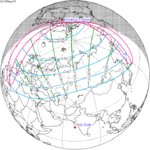 May 11, 1975 |
 February 26, 1979 |
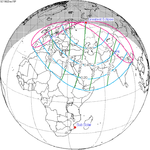 December 15, 1982 |
 October 3, 1986 |
| 126 | 128 | 130 | 132 | 134 |
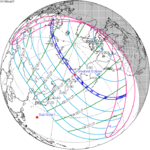 July 22, 1990 |
 May 10, 1994 |
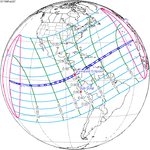 February 26, 1998 |
 December 14, 2001 |
 October 3, 2005 |
| 136 | 138 | 140 | 142 | 144 |
 July 22, 2009 |
 May 10, 2013 |
 February 26, 2017 |
 December 14, 2020 |
 October 2, 2024 |
| 146 | 148 | 150 | 152 | 154 |
 July 22, 2028 |
 May 9, 2032 |
 February 27, 2036 |
 December 15, 2039 |
 October 3, 2043 |
| 156 | ||||
 July 22, 2047 | ||||
References
- ^ Urrutia, Doris Elin (December 14, 2020). "Only total solar eclipse of 2020 thrills spectators in South America". Space.com.
- ^ "Thousands watch solar eclipse in Chile but fog and clouds mar view". December 14, 2020 – via www.reuters.com.
- ^ "Daytime darkness: Total solar eclipse wows in Latin America". www.spokesman.com.
- ^ "Solar eclipse plunges parts of Chile, Argentina into darkness for two minutes". France 24. December 14, 2020.
- ^ Cappucci, Matthew (December 14, 2020). "Year's only total solar eclipse swept across Chile, Argentina today". The Washington Post.
- ^ Garcia, Richard (30 December 2018). "Chile será protagonista de tres eclipses totales de Sol consecutivos por primera vez". EyN (in Spanish).
- ^ "December 2020 Eclipse Festival of Frequency Measurement". HamSCI.
- S2CID 228824043.
- ^ van Gent, R.H. "Solar- and Lunar-Eclipse Predictions from Antiquity to the Present". A Catalogue of Eclipse Cycles. Utrecht University. Retrieved 6 October 2018.
- ^ http://eclipse.gsfc.nasa.gov/SEsaros/SEsaros142.html








